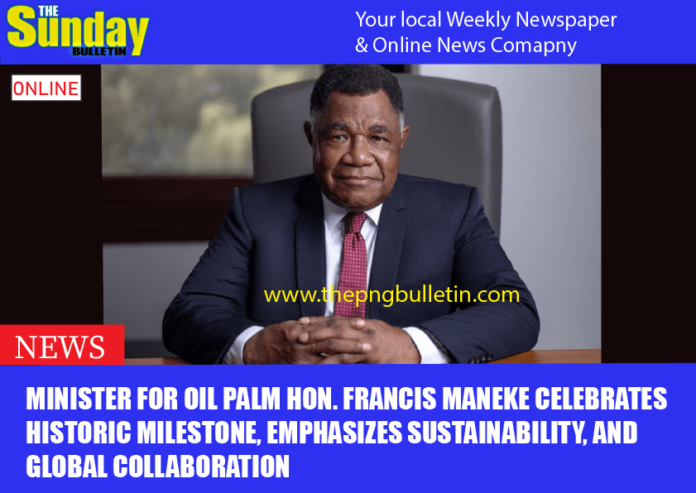PAPUA New Guinea (PNG) has officially become a full member of the Council of Palm Oil Producing Countries (CPOPC) as of December 30, 2024. This historic achievement elevates PNG to the ranks of leading global palm oil producers, including Malaysia, Indonesia, and Honduras, marking a transformative moment for the nation’s agriculture sector.
Minister for Oil Palm, Hon. Francis Maneke, celebrated this significant milestone, emphasizing its alignment with international sustainability standards and PNG’s national development priorities. The announcement follows the formal presentation of PNG’s Instrument of Accession, a process driven by the collective efforts of the government, industry stakeholders, and international partners.
Strengthening the Global Standing of PNG’s Oil Palm Sector
“This is not just a milestone but a strategic move that strengthens PNG’s position in the global palm oil market,” said Minister Maneke. “By becoming a member of CPOPC, we reaffirm our commitment to sustainable development while enhancing opportunities for smallholders and rural communities who depend on this vital sector.”
The Minister highlighted that the oil palm industry is the cornerstone of PNG’s agriculture sector, contributing approximately K2 billion (USD 494 million) annually, with smallholder growers accounting for 33.6% of production. CPOPC membership will empower these smallholders by improving representation, providing access to technical support, and driving productivity gains.
Meeting Global Standards: A Commitment to Sustainability
As a member of CPOPC, PNG is committed to adopting global best practices, including compliance with the European Union’s deforestation-free supply chain regulations and Roundtable on Sustainable Palm Oil (RSPO) standards. Minister Maneke emphasized, “This alignment with international standards not only opens access to critical markets but also reinforces our dedication to protecting PNG’s pristine environment and ensuring the long-term competitiveness of our palm oil sector.”
Empowering Growers and Communities
Minister Maneke reiterated the government’s unwavering support for smallholder growers, emphasizing that their success is vital to the nation’s broader economic and sustainability goals. He stated, “Our growers are the backbone of the palm oil sector. Through affordable inputs, high-quality seedlings, and targeted training programs, we aim to empower them to thrive in the global market.”
Collaboration for Shared Success
The Minister acknowledged the long journey to CPOPC membership, which began in 2020 and involved extensive consultation, legal clearance, and parliamentary ratification. He credited the collective efforts of the Oil Palm Industry Corporation, the Department of Agriculture and Livestock, and international partners.
“Our partnership with CPOPC provides access to research, training, and trade advocacy, enabling us to address industry challenges collectively and promote sustainable growth,” he added.
Alignment with MTDP IV and National Goals
The Minister emphasized how PNG’s CPOPC membership supports the nation’s Medium-Term Development Plan IV (MTDP IV) and its DIP 1.1 investment target for oil palm development, that is to expand oil palm cultivation to 600,000 hectares.
“CPOPC membership will enable us to attract international investments, implement key reforms, and achieve the targets set under MTDP IV. This includes increasing palm oil productivity, improving downstream processing capabilities, and expanding market access—all of which are critical to boosting economic growth and rural livelihoods,” he added.
The draft National Palm Oil Policy and proposed industry legislation reforms also position PNG to become a global leader in sustainable oil palm development. By prioritizing environmental sustainability, fair labor practices, and smallholder inclusion, the government aims to modernize the sector while fostering long-term growth.
A Call to Action: Uniting Stakeholders for Progress
The Minister urged all stakeholders, including public servants, growers, processors, and investors, to embrace this new chapter with a shared vision for progress. “Our full membership in CPOPC is a call to action to modernize the industry, meet global standards, and ensure that the benefits of growth reach every Papua New Guinean,” he stated.
With its membership in CPOPC, PNG is poised to lead the global conversation on sustainable palm oil production, strengthen its global presence, and secure a prosperous future for its people.

